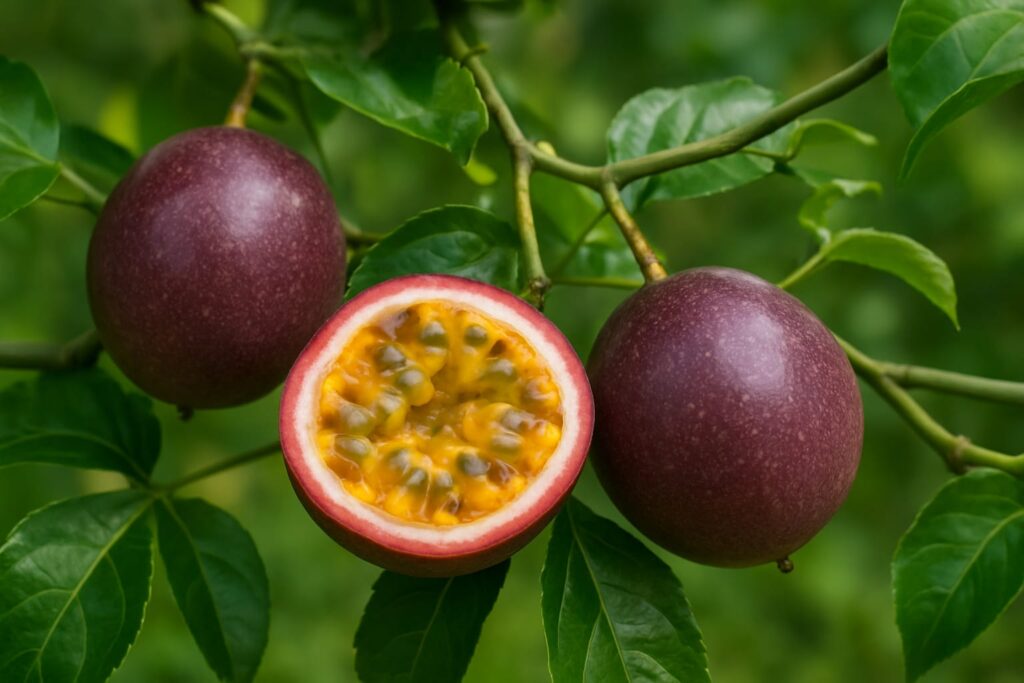Passion Fruit Benefits and Nutrition: The Ultimate Health Guide
Passion fruit is more than just a tropical delicacy: it’s a nutrient-dense fruit with remarkable health-promoting properties. Rich in vitamins, minerals, antioxidants, and dietary fiber, it offers a wide range of advantages for both body and mind. In this article, we will explore passion fruit benefits and nutrition in depth, covering everything from its vitamin content to its role in heart health, digestion, immunity, and beyond.

What Makes Passion Fruit Unique?
Before diving into the specific passion fruit benefits and nutrition details, it’s worth understanding what makes this fruit stand out. Passion fruit (Passiflora edulis) originates from South America but is now cultivated across tropical and subtropical regions worldwide. Its round shape, wrinkled skin, and aromatic pulp make it instantly recognizable.
Unlike many other fruits, passion fruit contains a gelatinous, seed-filled interior that is exceptionally rich in antioxidants. The seeds themselves are edible, crunchy, and high in beneficial plant compounds.
Moreover, passion fruit is versatile: it can be eaten fresh, juiced, blended into smoothies, added to desserts, or even incorporated into savory dishes. This flexibility makes it easier to include in daily nutrition.
Passion Fruit Benefits and Nutrition for Overall Health
Rich Source of Antioxidants
One of the most notable passion fruit benefits and nutrition aspects is its antioxidant profile. The pulp and seeds are loaded with vitamin C, polyphenols, and carotenoids. These compounds help neutralize free radicals, thereby reducing oxidative stress.
As a result, regular consumption may protect cells from premature aging and lower the risk of chronic diseases such as cancer, cardiovascular disorders, and type 2 diabetes.
Supports a Strong Immune System
Passion fruit benefits and nutrition are closely linked to immune defense. Vitamin C plays a central role in strengthening white blood cells and enhancing their ability to fight pathogens. In addition, beta-carotene, which the body converts into vitamin A, supports the health of mucous membranes and respiratory function.
Therefore, eating passion fruit regularly may reduce the severity and frequency of common infections like colds and flu.
Promotes Digestive Health
Dietary fiber is another critical element of passion fruit benefits and nutrition. Each serving provides a significant amount of soluble fiber, which contributes to smoother bowel movements, helps prevent constipation, and promotes the growth of beneficial gut bacteria.
Furthermore, the combination of fiber and natural enzymes makes this fruit particularly effective at supporting digestion without causing bloating or discomfort.
Passion Fruit Benefits and Nutrition for Heart Health
Heart health is one of the most researched areas concerning passion fruit. The fiber content helps lower bad cholesterol (LDL) levels, while potassium regulates blood pressure by balancing sodium levels.
Additionally, passion fruit contains plant sterols and polyphenols that improve arterial flexibility and circulation. Over time, these factors work together to reduce the risk of hypertension, stroke, and coronary artery disease.
Enhances Skin Appearance and Anti-Aging
Another key aspect of passion fruit benefits and nutrition is its effect on skin health. Vitamin C boosts collagen production, which keeps the skin firm and elastic. Meanwhile, antioxidants protect against UV damage and slow down wrinkle formation.
Many skincare products now incorporate passion fruit extract due to its hydrating, brightening, and anti-inflammatory properties. However, consuming the fresh fruit delivers these nutrients directly from the inside out.
Passion Fruit Benefits and Nutrition for Weight Management
Maintaining a healthy weight can be challenging, but passion fruit provides natural support. With its low calorie count and high fiber content, it promotes satiety and reduces cravings.
In addition, the fruit has a low glycemic index, meaning it does not cause rapid spikes in blood sugar. This makes it an excellent choice for individuals managing diabetes or those looking to avoid overeating.
Key Nutrients Found in Passion Fruit
Vitamins in Passion Fruit
Passion fruit benefits and nutrition come from a diverse set of vitamins, including:
- Vitamin C: Boosts immunity and collagen production.
- Vitamin A (beta-carotene): Supports vision, skin, and immune function.
- B-complex vitamins: Aid in metabolism, nerve health, and energy production.
Minerals in Passion Fruit
Beyond vitamins, passion fruit contains valuable minerals:
- Potassium: Regulates blood pressure and muscle contractions.
- Magnesium: Supports bone health and reduces stress.
- Iron: Contributes to oxygen transport in the blood.
- Phosphorus: Strengthens bones and teeth.
These nutrients work synergistically to support multiple body systems.
Plant Compounds and Antioxidants
Flavonoids and polyphenols are also abundant in passion fruit. These plant compounds provide anti-inflammatory effects, improve circulation, and protect against chronic illness.
Research shows that flavonoids from passion fruit may even play a role in reducing anxiety and promoting relaxation by interacting with neurotransmitters in the brain.
Passion Fruit Benefits and Nutrition for Mental Well-Being
Passion fruit is sometimes called a “natural relaxant.” Studies suggest that certain compounds within it, including alkaloids and flavonoids, have mild sedative effects.
Consequently, consuming passion fruit or its extract may reduce symptoms of anxiety, improve sleep quality, and support mental clarity.
In addition, the magnesium content helps regulate mood and prevent stress-related disorders.
How to Incorporate Passion Fruit into Your Diet
Knowing about passion fruit benefits and nutrition is valuable, but putting it into practice matters even more. Here are some practical ways to enjoy passion fruit daily:
- Fresh pulp: Simply scoop it out and eat with a spoon.
- Smoothies: Blend with banana, pineapple, or mango for a tropical boost.
- Juices: Combine with citrus fruits for a refreshing drink.
- Desserts: Use as a topping for yogurt, ice cream, or cakes.
- Salads: Mix with avocado, spinach, and nuts for a nutrient-rich meal.
Transitioning to a diet that regularly includes passion fruit can enhance both taste and health.
Possible Side Effects and Precautions
While passion fruit benefits and nutrition are impressive, moderation is essential. The seeds are safe for most people, but individuals with latex allergies may experience cross-reactions. In rare cases, excessive consumption might cause digestive discomfort due to high fiber content.
Therefore, it is advisable to start with moderate amounts and gradually increase intake. Pregnant women and those with medical conditions should consult a healthcare provider before consuming passion fruit supplements.
Passion Fruit Compared to Other Fruits
Compared with common fruits like apples, oranges, or grapes, passion fruit offers a higher concentration of fiber and antioxidants per serving. Although smaller in size, its nutritional density is remarkable.
As a result, adding passion fruit to a balanced diet provides more targeted health benefits without significantly increasing calorie intake.
Final Thoughts on Passion Fruit Benefits and Nutrition
Passion fruit is not just an exotic treat: it is a powerhouse of nutrients with wide-ranging health effects. From strengthening the immune system to improving heart health, aiding digestion, supporting mental well-being, and enhancing skin, the list of benefits is extensive.
By incorporating passion fruit into your diet, you can enjoy both its vibrant flavor and its substantial contribution to long-term health.
Ultimately, passion fruit benefits and nutrition make it one of the most valuable tropical fruits to include in a wellness-oriented lifestyle.
